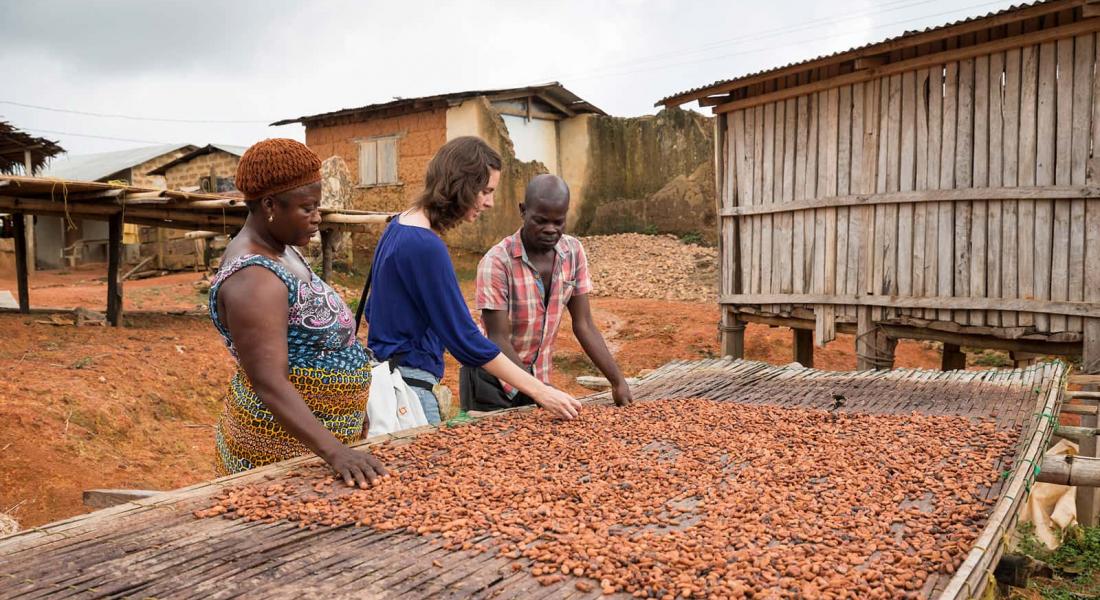
In a lush, quiet grove in a remote area of Ghana’s Central Region, three farmers are demonstrating to Sofía del Valle how cocoa is harvested. It is early July, during the smaller of two annual harvests. The trees have been mostly cleared, and the remaining pods look like elongated gourds with hard, bumpy shells in brilliant yellows, oranges, and reds.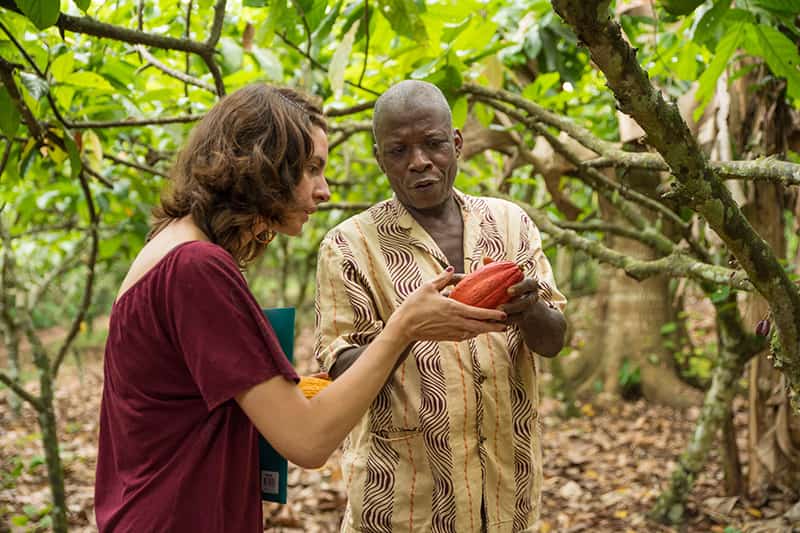
Cocoa harvesting is a delicate process that hasn’t changed much since cocoa was introduced to Ghana in the 1870s. It is done by hand, requiring only a machete or other cutting tool and a basket.
So, in a way, to watch these three farmers, two men and one woman, expertly harvest the pods is to see generations of their ancestors doing the same thing.
The two men, Emmanuel and Kofi, use their machetes to gently tap the short stems of the cocoa pods, which fall onto layers of plantain leaves covering the ground.
The woman, Theresah, who is Emmanuel’s wife, gathers the pods into a handwoven basket the size of a washtub. When it is full, she lifts the heavy basket onto her head and gracefully carries it to the spot in the grove where the cocoa is fermented.
At the fermentation spot, the men gently tap each fruit two or three times to break it open. Theresah hovers low to the ground and scoops out each pod’s 40 to 50 thick white seeds, each about the surface area of a quarter. She piles the seeds and surrounding pulp onto plantain leaves and covers the pile completely with more leaves to promote fermentation, a pungent, five- to seven-day process in which microorganisms consume the sugar in the seeds, leaving dry, dark beans.
Afterward, the farmers collect the beans and spread them onto tables covered with bamboo mats to dry outside for about a week. The beans must be stirred several times a day to dry evenly, and farmers accomplish this by sweeping their hands and arms over them while simultaneously searching for imperfect beans.
From there, the beans are bagged and sold. And, as for generations, the male farmers are paid.
Master of Global Affairs (MGA) student and Kellogg Fellowship Recipient Sofía del Valle has come to Ghana to examine, among other issues, this gendered practice and its implications.
“When women have money and they control money in these families, they invest it in their families and kids and even farms, whereas men don’t necessarily do so,” she explains. “So in the end, improving a woman’s situation is not only good for her, but it’s for the well-being of the whole community. Children of women who earn more money get more education and better living conditions. If you solved this thing, it’s better for the whole community.”
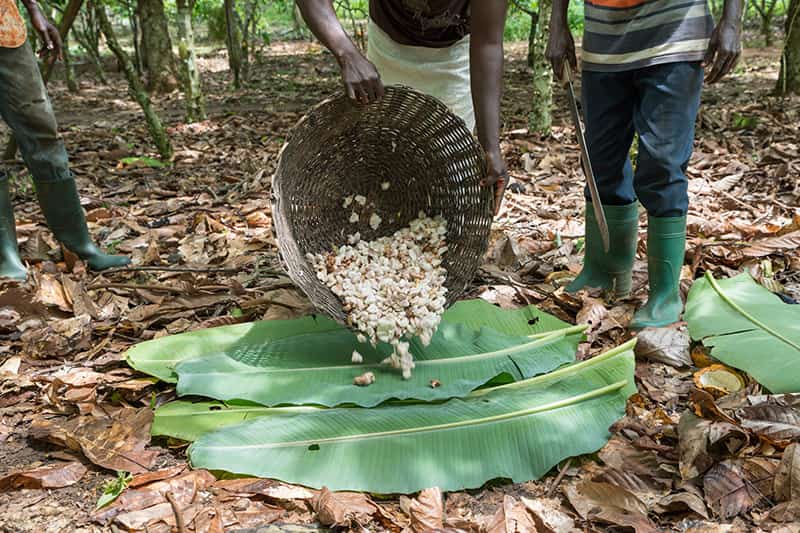 Still, she emphasizes, she isn’t in Ghana to solve gender inequality. Instead, she is conducting fieldwork to gain a deep understanding of every facet of cocoa farming and the larger supply chain for chocolate. Her observations are meant to inform policy about ways to improve the lives of female cocoa farmers.
Still, she emphasizes, she isn’t in Ghana to solve gender inequality. Instead, she is conducting fieldwork to gain a deep understanding of every facet of cocoa farming and the larger supply chain for chocolate. Her observations are meant to inform policy about ways to improve the lives of female cocoa farmers.
Her fieldwork is based in Accra, Ghana’s capital, and she works in conjunction with Oxfam, a nongovernmental organization (NGO) that focuses on alleviating global poverty.
For the next six weeks, she will speak with Ghanaian governmental agencies and private organizations that are part of the cocoa supply chain.
Most important, she will visit six remote villages that lie a difficult three or four hours’ journey north of Accra – places where the simple clay or thatch homes usually don’t have plumbing or electricity and where obtaining the basics of life can be complicated.
In these villages she’ll interview farmers to learn about the growing and harvesting of cocoa and what steps are delegated to men or women.
But first it’s important to understand the Notre Dame program that brought her here.
Del Valle’s fieldwork in Ghana is part of the Keough School of Global Affairs MGA and its Integration Lab, or i-Lab, a three-component professional experience that refers to a physical space, a curriculum that involves a variety of academic disciplines, and a global project. As the MGA’s first cohort, the 38 students from 22 countries also are the first to experience the i-Lab.
The idea for the i-Lab took shape in planning for the 2017 launch of the MGA, a two-year professional program through the Keough School of Global Affairs.
“In creating the i-Lab, we wanted to answer a foundational question: How can we offer our students the most valuable theory-to-practice experiences to contribute to solving global problems?” explains Kellogg Faculty Fellow Steve Reifenberg, co-director of the i-Lab and associate professor of the practice of international development at the Keough School.
“The answer needed to pull together a variety of disciplines because global problems can’t be addressed by a single field. It needed to promote teamwork because problems aren’t solved by individuals. It needed to involve partner organizations that address world problems to give students on-the-ground understanding of how policy is shaped into practice.”
Additionally, the unconventional basis for the i-Lab meant it needed unique physical space to inspire innovation, promote collaboration, and facilitate creative problem solving.
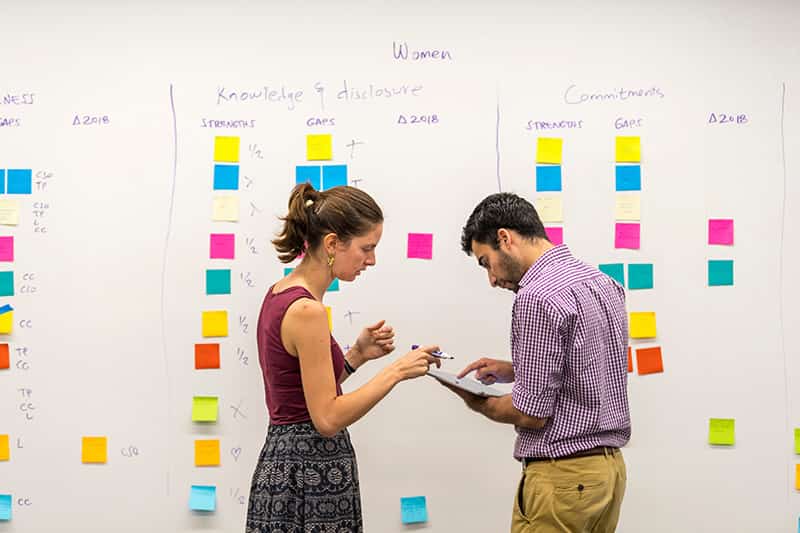 “Every element in this space was developed to promote maximum flexibility,” explains Kellogg Faculty Fellow Tracy Kijewski-Correa, i-Lab co-director and Leo E. and Patti Ruth Linbeck Collegiate Chair for the Department of Civil and Environmental Engineering and Earth Sciences, who is also an associate professor of global affairs.
“Every element in this space was developed to promote maximum flexibility,” explains Kellogg Faculty Fellow Tracy Kijewski-Correa, i-Lab co-director and Leo E. and Patti Ruth Linbeck Collegiate Chair for the Department of Civil and Environmental Engineering and Earth Sciences, who is also an associate professor of global affairs.
“The space needed to be dynamic because our teaching modes are not traditional. It needed to be highly flexible for collaborative teams to work through stages of their project design and implementation. So elements of the space bring best practices regarding creativity and inspiring creativity. We emphasize design as a big part of what we do, and this space facilitates design.”
Whiteboard walls provide huge writeable and erasable surfaces. Accent walls and chairs inject energy into the room with bright orange, teal, and chartreuse. The tables are easy to wheel from place to place. There are rubber balls, modeling clay, and sticky notes everywhere.
It’s the ideal environment to teach students about design thinking, negotiation, systems thinking, and implementation science during their first semester.
“We call it the Integration Lab because of the integration of these different interdisciplinary perspectives, ways of seeing these different backgrounds and integrating theory into practice,” Reifenberg explains. “We want our students to develop an integration mindset about how they might work together effectively in teams, partner well with organizations, or accompany others who are affected by global problems.”
Perhaps the most notable component of the i-Lab is its Global Partner Experience, in which student teams in two concentrations of the MGA – sustainable development and global affairs – work closely for a year with an NGO, nonprofit, think tank, or other organization to create a project to respond to a challenge that the organization is addressing. The highlight of the partnership is a fieldwork assignment, usually for eight weeks in a different country.
The point of the project is not for the students to solve problems for the organizations. Instead, they are helping the organizations to understand these layered, complex problems better.
The partnership begins with teams of three or four students carefully matched according to their skill sets to a global organization, for maximum benefit to both the student and the organization.
“The partner comes with an opportunity or an issue that they’re facing, and the teams build out a strategy for how will we address this together and how will we collect necessary data,” Kijewski-Correa says. “So it looks like a consultancy model. The partner is saying, ‘This is what we need. What do we need to develop as a deliverable to get there?’ And the teams work intensively with their partners throughout the year-long engagement.”
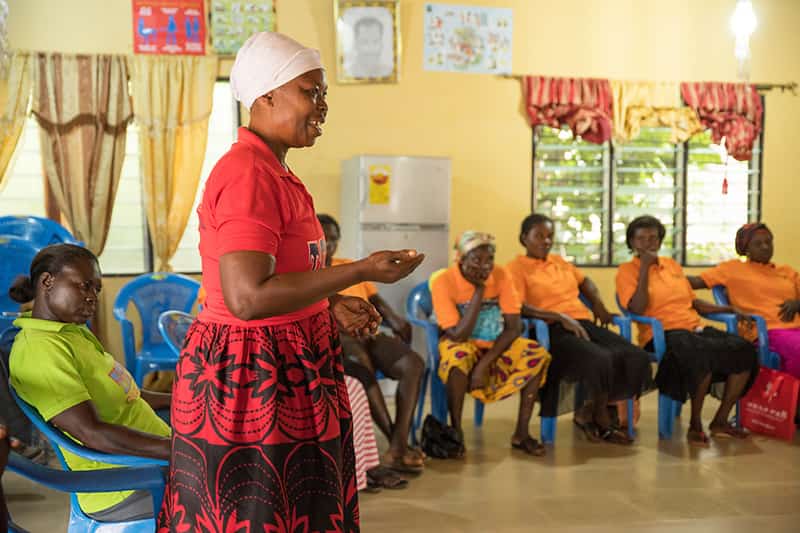 The Global Partner Experience kicks off in January when the teams start working remotely with representatives from their respective organizations. Melissa Paulsen, faculty adviser for the i-Lab, emphasizes the time and commitment required by both the organization and the MGA students.
The Global Partner Experience kicks off in January when the teams start working remotely with representatives from their respective organizations. Melissa Paulsen, faculty adviser for the i-Lab, emphasizes the time and commitment required by both the organization and the MGA students.
“It’s not a rushed process,” says Paulsen, who advised two MGA teams in the cohort. “When you’re working on really thorny, difficult problems, it takes time. We’re focusing on understanding the complexity of the problem, unpacking it, and maybe helping understanding the solution an organization is trying to introduce. So that is an elongated process, and in the development world, that is something very necessary to create long-lasting, sustainable change. We can’t rush from problem to solution, especially when we’re shaping students who are going to be practitioners and policymakers.”
In addition to working with Paulsen, Kijewski-Correa, and Reifenberg, the MGA teams connect with faculty from multiple disciplines across campus who have expertise in certain countries or regions, political or societal issues, experience with partner organizations, or other relevant backgrounds.
The inaugural MGA cohort was assigned to projects with the Bangladesh Centre for Advanced Studies; the Program in Global Surgery and Social Change at Harvard Medical School in Ethiopia, Tanzania, and Sierra Leone; the United States Conference of Catholic Bishops at the US/Mexico border, Greece, Germany, and Switzerland; Enseña Chile; Habitat for Humanity Terwilliger Center for Innovation in Shelter in the Philippines; and the Institute of Economic Affairs in Kenya.
Del Valle and MGA teammates Caroline Andridge, who also is a Kellogg Fellowship recipient, and Mian Moaz Uddin were matched with Oxfam America in conjunction with Oxfam country offices in Ghana, Malawi, and India.
Unlike the other MGA teams that either traveled together or split into sub-teams of two or three, the Oxfam team split with individual teammates assigned to separate countries. While del Valle was assigned to Ghana, Mian was assigned to Oxfam in Malawi to examine the complex land rights in that country. Andridge was embedded with Oxfam in India to learn about sugar farming, production, and distribution.
Oxfam operates in more than 90 countries and oversees dozens of campaigns aimed at eliminating poverty.
Del Valle, Andridge, and Mian work with Oxfam’s Behind the Brands (BtB) initiative that challenges and collaborates with 10 international food and beverage companies to improve their social and environmental policies and practices. BtB aims to improve the lives of farmers, workers, and communities by addressing problems such as climate change, land rights, and gender issues. The MGA Oxfam team’s work ultimately will inform BtB efforts in the corresponding countries and make an impact on farmers’ lives.
The 10 companies, referred to as the “Big 10,” are ABF/Illovo, Coca-Cola, Danone, General Mills, Kellogg, Mars, Mondelez, Nestle, PepsiCo, and Unilever.
“Our key question was, ‘How do we take these really smart, energized sustainable development students and plug them into an existing piece of Oxfam’s work – preparing them as a team, sending them individually into the field to do separate projects, and then bringing them back together to finalize their deliverables?’” says Emma Fawcett, evaluation, learning, and effectiveness adviser for Oxfam America.
The answer developed as Fawcett, the students, and Paulsen, who served as faculty adviser, dove into the project. Fawcett visited in person for two days in March for an intensive working session. After that, she and the team were in constant contact through email and weekly phone briefings.
They believed the students would be most helpful if they could get an understanding of the relationship between companies and communities, especially focusing on what kind of impact BtB had already had, Fawcett said. “We need to understand what’s happening on the ground in these value chains to help us decide where to focus our efforts on engaging the BtB companies. We wanted to find that sweet spot where we can use our leverage and advisory role to have the greatest impact with the communities.”
Which brings us back to Ghana.
Somehow del Valle’s unlikely interview system is working marvelously.
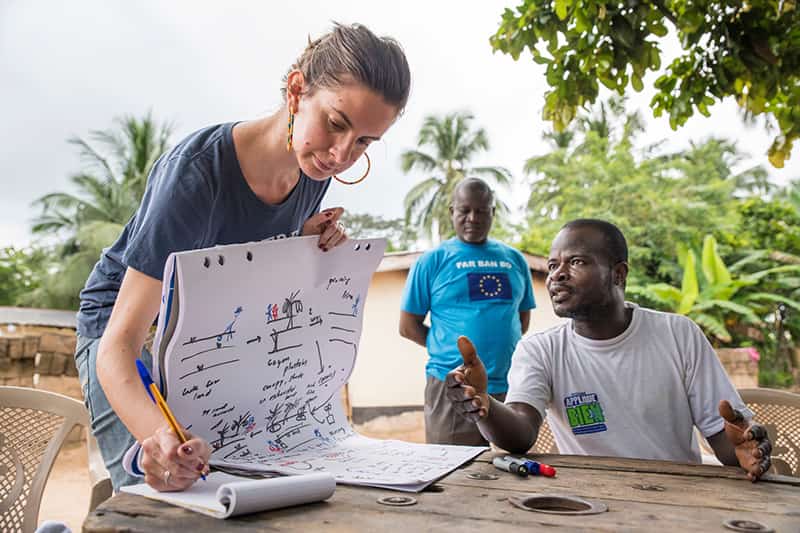 Though she had worried that farmers might be reluctant to talk about their lives, they are, in fact, happy to share. The men and women in the first village talk about the steps of cocoa farming down to the last detail. They speak and gesture passionately, sometimes arguing good-naturedly over a method or process, or inserting a detail that another farmer has skipped.
Though she had worried that farmers might be reluctant to talk about their lives, they are, in fact, happy to share. The men and women in the first village talk about the steps of cocoa farming down to the last detail. They speak and gesture passionately, sometimes arguing good-naturedly over a method or process, or inserting a detail that another farmer has skipped.
Del Valle, while enjoying the conversation immensely, doesn’t understand a word. The villagers are speaking in Twi (pronounced “tree”), the dominant language of south and central Ghana. Del Valle is from Chile and speaks Spanish natively and English secondarily.
To understand the villagers, del Valle relies on Martha Mensah, a program officer of Oxfam of Ghana, to translate Twi into English. Impressively, Mensah manages to keep the conversation from stalling.
As soon as Mensah translates, del Valle uses a marker and a large piece of paper to quickly draw the farming step described. She has a knack for it, and her stick figures reflect the processes of farming cocoa. Perhaps the most important part of the exercise is asking the farmers to identify what steps women perform versus men.
For the rest of this day and all of the next, del Valle and Mensah repeat this exercise in five other villages, each time pulling together information for del Valle’s field research and allowing the farmers a chance to tell their story and, possibly, reflect on women’s roles in ways they might not have done previously.
The time with the farmers is exhilarating to del Valle. “I was so honored that the farmers received me so kindly,” she said. “There’s a stereotype of a poor, downtrodden farmer, but these men and women were so wise and strong and expansive. I never felt that they were vulnerable – in fact, it was me who was vulnerable and nervous. That doesn’t mean there’s no struggle because there is, and the unfair elements of the cocoa system need to be changed.”
“But they are living their lives and keeping it together. And I admire them so much.”
This includes the male farmers who don’t share pay with their wives.
“There can be a temptation to simplify situations and villainize men for gender problems, but oftentimes there are bigger forces at work,” she explains. In Ghanaian society, it is typically the man’s job to provide financially and the woman’s job to take care of the home. Finances are controlled by the man. These are longstanding societal frameworks that are not easily changed.
No stranger to examining gendered practices, del Valle formerly worked for an NGO in Chile, advising mining companies on their community engagement processes, including efforts that focus on improving women’s lives.
So she understands the layers of complexity associated with change in this regard.
“The male cocoa farmers I met were open about their own experiences,” she says. “Nor did they try to stop the women from speaking about being left out of selling or payment. The women were comfortable in expressing themselves and criticizing the unfairness of the process.
“The men seemed respectful in listening and seemed to be contemplating the women’s concerns. I’m not saying husbands don’t hold responsibility in this matter. I’m saying it’s a bigger issue than seeing the men as villains.”
The definition of who is a farmer likely contributes to the gendered attitudes among cocoa farmers. Women in Ghana aren’t typically considered farmers. Instead, they are seen as supporting their husbands’ or families’ efforts. “Their labor isn’t accounted for as formal labor,” del Valle explains.
Yet, during her interviews in the six villages, it is abundantly clear that women perform many steps in the farming process. Both men and women who del Valle interviewed said that women take part in planting, weeding, harvesting, fermenting, drying, and stirring.
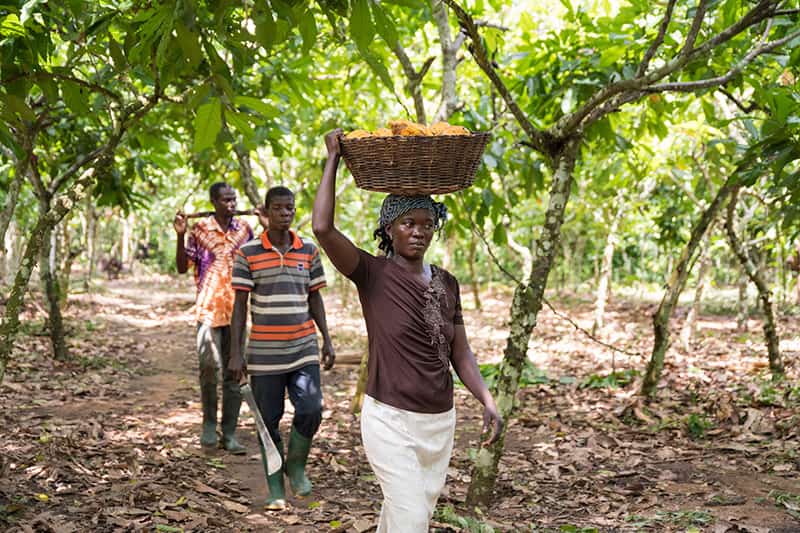 It’s estimated that women perform 40 to 50 percent of cocoa farming responsibilities in Ghana, and del Valle’s interviews seemed to bear out these figures.
It’s estimated that women perform 40 to 50 percent of cocoa farming responsibilities in Ghana, and del Valle’s interviews seemed to bear out these figures.
On top of that, women take care of children and all of the responsibilities of the home. During the times that women aren’t directly performing farming responsibilities, they are often supporting farming by cooking and taking the food to the men as they work in the cocoa groves.
This unpaid and unrecognized work is referred to as “time poverty,” del Valle explains. “Because of a woman’s unpaid responsibilities, she has less time to do work that could earn her a wage.”
Gender inequality is just one aspect of several complicated problems that exist with cocoa farming. Another is financial management skills for farmers who are paid once a year for their crop and need to make the payment last until the next harvest. In addition, farmers face increasing challenges from climate change in the form of erratic rainfall and degrading soil conditions.
Moreover, major chocolate manufacturers can do more to share profits and increase the partnership with cocoa producers. While international chocolate companies involved with Behind the Brands – Mars, Mondelez, and Nestle – have a goal of improving farmers’ lives, the geographical isolation of smallholder farms alone is formidable enough to hinder successful outreach or contact. The farmers del Valle met didn’t always know what happened to their beans after they sold them. They weren’t sure which companies ended up with the beans or how they were processed. It is even common in Ghana for cocoa farmers to have never tasted chocolate, the end product of their hard work.
During her time in Ghana, del Valle checked in regularly with her teammates, Mian and Andridge. Though the students’ field assignments were different, they discovered common threads to the problems they were examining.
At the heart of each of their findings was an opaque and sometimes confusing supply chain with more intermediaries, including governmental players, than they had anticipated.
“The distance between the farmer and the company is much greater than we expected,” Andridge says. “We went into these field experiences thinking that we would be able to simplify the understanding of the supply chain, but, in fact, the understanding became more complicated. There are many steps still to be figured out.”
With their firsthand observations in hand, del Valle, Andridge, and Mian left their fieldwork placements to spend a week in Washington, DC, with Oxfam representatives who work with the BtB initiative.
They presented their findings in detail, especially addressing the challenges that the BtB program will likely face as implementation continues. Though much of this information is proprietary, the team members said they emphasized the importance of communication between Oxfam country offices and the global team. In addition to the initial report, the MGA students presented a formal deliverable to Oxfam.
Even before presenting to Oxfam, the team received unexpected validation. As Mian was preparing to leave his assignment in Malawi, his supervisor asked him to review proposals by a potential consultant.
“When I was going through the proposals by these consultants with 20 or 30 years of experience, I realized they are pretty much doing what we have been doing,” he says. “We accomplished a project that could be considered actual consultancy. And if the work they are going to do is real, then our work was real.”
 All three students said the i-Lab experience was a top reason they chose the Notre Dame MGA.
All three students said the i-Lab experience was a top reason they chose the Notre Dame MGA.
“It was really a big focal point,” says Andridge, who formerly worked for the Council on Foreign Relations, a think tank in Washington, DC, and then received a Princeton in Africa fellowship to work in South Africa with the Clinton Health Access Initiative for HIV prevention.
“Notre Dame frames the i-Lab and Global Partner Experience as a yearlong consultancy, and that’s what our partnership has been. That was really important to me. It gave me the chance to work and engage deeply with an organization that has extensive experience in the area I’m interested in – food security.”
Del Valle agreed the experience would help her future.
“A meaningful and serious experience with a big organization that is taking our work seriously elevates me from a girl from Chile that was only working on Chilean stuff to someone who was working on a global initiative in many countries with an NGO,” she says. “That is great. I feel like it opens the world to me jobwise.
“Before now, I would have felt kind of weird applying to a job outside of Chile. Now I feel pretty confident applying anywhere in the world because I’ve had this experience. So that’s pretty cool.”
Beyond that, her professional experience in Ghana has, of course, shaped her personally. “For example, when I think about climate change now, I think about how life will be harder for the farmers that I met in Ghana if we don’t take care of it,” she says. “When I think about the inequality that women face, I think about the strong women that I met in Ghana.
“These issues are so real. I think about that in my personal space much more than I did before.”
Originally posted at www.nd.edu. Produced by the Office of Public Affairs and Communications and the Keough School of Global Affairs
Photography: Barbara Johnston





